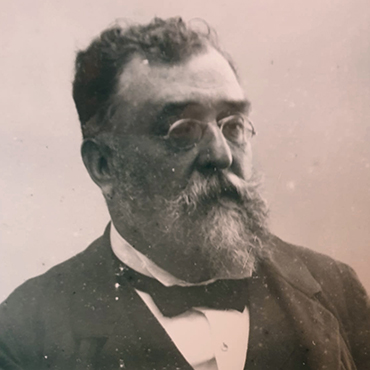Passano was born in Genoa in 1846 from a noble family (strictly papalist on the mother’s side), but, when still young, he lost his father but also received a substantial inheritance. He attended primary school with the Salesians and, when he finished high school, he read law at the University of Genoa until 1865.
After he met Paris Maria Salvago, who would become an important figure in his life, he started to write for the “Annali cattolici”, which Salvago had founded – he was sent to the Malines Congress, where Catholics discussed their role in society – and to direct his studies towards liberal Catholicism in France. He wrote often for Salvago’s journal (subsequently he became its join manager and owner), frequently using the pseudonym of conte di Carinola. He covered a variety of subjects but always promoted the need to reconcile sincere belief in the Catholic faith on the one hand with being Italian on the other.
When the “Annali” became “Rivista universale”, where its cultural direction was inspired by liberal Catholicism, he clashed with the intransigent and anti-Italian Catholicism of “Civiltà Cattolica”. The discord, enflamed by the firm stance he adopted against the dogma of papal infallibility and in favour of the so-called “Law of Guarantees” (separating the spheres of influence of the Italian state and of the Vatican and limiting the temporal powers of the Pope), eventually resulted in lawsuits. Because of the strong opposition on the part of the more intransigent Catholic circles, the journal was moved from Genoa to Florence, an environment more suitable for its location.
Despite the papal ban on Catholics taking part in politics (non expedit), Passano was in favour of a liberal conservative party that would defend private property and Catholic values and therefore supported the project of Count Paolo Campello della Spina, though eventually it was unsuccessful. However, Passano made Campello della Spina’s political programme his own and, because he did not feel in complete agreement with Paris Maria Salvago, he left the “Rivista universale” and in 1879 founded the “Rassegna nazionale”, of which he was sole proprietor and editor.
This journal had a European resonance, and its writers included the most important exponents of liberal Catholicism, both Italian and international, from Franz Xaver Kraus to Marie-Joseph Lagrange and Denis O’Connell, from Antonio Fogazzaro to Giovanni Semeria, Salvatore Minocchi and Geremia Bonomelli. The opposition of the church hierarchies towards modernism drove the “Rassegna” to adopt positions that were more strictly political, but not strong enough to give birth to a leading party. This was in part due to the conflict between the two different philosophies of the journal, one more conservative and the other more open to demands for social and cultural innovation. Having kept the journal alive using entirely his own money, in 1915 Passano reached a point where he was forced to give it away for nothing to Antonio Ciaccheri Bellanti and Roberto Palmarocchi.
His political commitment had never failed (he had been a provincial councillor in Genoa in 1886 and in La Spezia in 1889), nor had he ever given up his dedication to workers’ groups with a Catholic imprint and to local school politics. His work as editor of culturally influential journals was, nevertheless, the linchpin of his public life, which also crossed the path of Raffaello Caverni: indeed, Caverni’s most controversial works, De’ nuovi studi della filosofia (which was subsequently issued as one book and eventually black-listed) and Dell’antichità dell’uomo secondo la scienza moderna, were published in instalments first in the “Rivista universale” and then in the “Rassegna nazionale”. Manfredo da Passano died in Florence in 1922.

